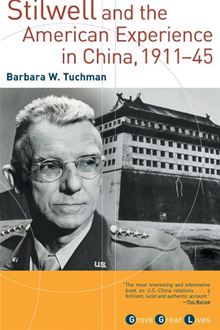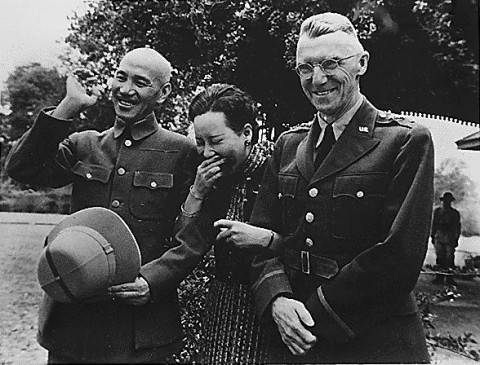A superbly researched and written study of Chinese and American relations during World War II told through the experiences and career of Joseph Stilwell, who first went to China in 1911 and left in 1944. He was a twenty-eight year old lieutenant when he arrived and a sixty year old four star general when he left. The book is detailed in its 530 pages of text and supplemented with nearly a hundred more pages of appendices and notes. Tuchman wears her scholarship lightly and the book reads itself. There is far too much to summarize so I offer a few conclusions.

First as to China, the inescapable fact is that Chiang Kai-Shek was a warlord who pretended to be the national government, and credulous and desperate Americans accepted that claim. The credulous spoke no Chinese and did not venture beyond Chiang’s court. They included diplomats, journalists, missionaries, business men, and soldiers. The desperate wanted to keep China in the war to hold down the Japanese occupation force estimated at one million men who would not then be fought in the Philippines or Malaya. They included FDR and George Marshall. FDR long nursed the hope that China would emerge as a friendly great power in Asia after the war, and was willing to pay an enormous price toward that end until even this great optimist gave up on Chiang.
What distinguished Chiang from the other warlords who ruled fiefdoms when the dynasty decayed and collapsed was his pretentious claim to the nation (over the corpse of Sun Yat-Sen) and Madame May Chiang, a Wellesley graduate, who acted as his press agent to good effect. They affected Western ways and talked airly of sovereignty and democracy while their death squads reduced the competition. Think of Ann Coulter with a Uzi.
What Chiang wanted was to stay out of the war and let the barbarians fight each other, the barbarians being Japan and the Allies (Britain, USA, and Holland). Invaders come, the Manchu, the Mongol, but then they go. Insofar as he had a strategy it was to retreat and retreat until that happened, and then to reassert his authority by being on the winning side.
To reassert his power he needed the material wealth of American Lend-Lease which he took as a gift and offered no lease in return. Rather he cached this wealth for inevitable conflict with the Communist Chinese in the distant north. The Communist being Chinese were the real threat. To secure American largesse and protection to some degree, Chiang went through the motions of fighting the Japanese. At times this took the form of press statements describing gigantic battles in which the noble Chinese defeated, against all odds, the Japanese. The credulous took these press releases at face value. Stilwell did not.
Stilwell went to the alleged battlefields to see for himself, and he knew the lies for what they were. But because of the desperation to keep Chiang, read China, in the war, Washington did nothing, and there was probably nothing that could be done.
Turning then to the man: Stilwell loved and hated China. He had a facility and interest in languages before he went to China, and there he learned Chinese and became fluent. He was a driven man, restless, energetic, determined, smart, and over the years very knowledgeable of China and Chinese. He was also tactless and volatile, and Chiang was a ready catalyst. Stilwell came to despise Chiang and to see the Kuomintang regime as a nearly impotent fascist dictatorship – a message no one wanted to receive in Washington. True to his calling Stilwell as a soldier tried to make the best of the bad marriage, often by staying as far away from Chiang as possible, in Burma.
He did try to paper over the cracks for the sake of the war effort. Witness this picture, three people who hated each other smiling for the camera, which certainly does lie. (I say it this way because one infers from Tuchman’s pages that there was little love-lost between Madame Chiang and her husband; it was a family alliance.)

In Burma Stilwell did the impossible. He built the Burma Road over impossible terrain after having been told by British colonial officials it was impossible, technically, politically, and militarily. He created an army out of the rejects Chiang let him have, hoping that he would fail and be recalled to be replaced by a more compliant officer. This army defeated the Japanese and drove them out of Burma again after being told it was impossible by the British, whose principal interest was to retain the colonies after the war, not to fight Japanese.
Stilwell found the Chinese soldier cheerful, durable, quick to learn, and responsive to leadership. A hopeless generalization of course: ‘the Chinese soldier.‘ Stilwell respected Chinese people as much as he despised the warlords who misruled them. And that respect is part of what kept him in China. He could have left at nearly anytime by asking to be relieved.
Stilwell was a leader, of that there is no doubt. He was creative and resourceful, using what he had, starting where he was, and doing what he could. If the Chinese troops were untrained he would train them, and he did that sometimes personally, lying on the rifle range with recruits showing the action of the rifle. If they were hungry he would find food for them. If they were wounded he would supply doctors, nurses, and medicine. If they were low on ammunition he would get it somewhere, somehow. The miracles were daily.
Perhaps the most famous example is the best. When defeated by the Japanese the first time, he led his headquarters staff of 114 on a walk out of the northern Burmese jungles. He was a gruelling task master on the walk at 105 paces a minute. He was a tyrant over the food and water, and all but assaulted stragglers. As the Commander-in-Chief he was expected to fly out and direct the retreat from India, but Stilwell wanted to show to his defeated troops that he was one of them, one with them and so he walked just like they did. Their fate was his fate.
On he went at 105 paces a minute, at the end of the walk most of the 114 men hated him, and that was a tribute to Stilwell, because all 114 of them survived. Not one was lost on the two weeks in the circle of hell through which they walked. Rain, jungle, no road, no maps, dehydration, no local guides, no porters, Japanese planes, out of touch, occasional rifle fire from Japanese patrols, exhaustion, wildlife, malnutrition, and disease; the list goes on.
Stilwell ate with his men, ate what they ate. He stood in line at the mess tent for food or for the barber’s chair. He wore one set of clothes until they rotted away. He seldom wore the stars of his rank. When he did it was to show the soldiers that their general was there with them. When he went to Chiang’s court he borrowed a uniform because he had none. He carried a rifle in Burma and used it more than once. When he sent men on forced marches through terrible terrain, he went with them to see for himself what it was like. He accepted the promotions and medals that came without ceremony, no photographers present to immortalize his genius recognized. The only medal he valued was the Combat Infantry Man’s Badge, the only general to earn this medal. He was holding it when he died about a year after he left China.
The warlord generals, including Chiang, were not like this. In defeat Stilwell became something of a legend in the minds of many Chinese solders and this made him all the more frightening to Chiang. After that first encounter with the Japanese, Stilwell publicly admitted defeat and silently vowed to return, which he did without the histrionics of Douglas MacArthur.
The puzzle of Chinese politics gave the red baiters in post-war American politics much with which to play. Stilwell was duly blamed for not giving Chiang enough support (material) and for concentrating on fighting the Japanese rather than heading off the Communists, etc. Such hindsight as is given to the gods. All drivel to be sure, but it happened, as much drivel still does. Check the news today.
George Marshall figures in much of this story and as always seems to be both a pillar of strength and a sage. I single him out since I reviewed a biography of him earlier on this blog.
John Stuart Mill said one man with an idea can do a lot. Stilwell was such a man. His idea was that the Chinese deserve better than Chiang and his kind. His example also shows what one person with enormous energy and good will cannot do: the impossible.
His story has parallels with others. In the Peloponesian War Sparta sent one man, the general Brasidas, to northern Greece and he, too, very nearly won the war. Stilwell was that Spartan.
Skip to content
